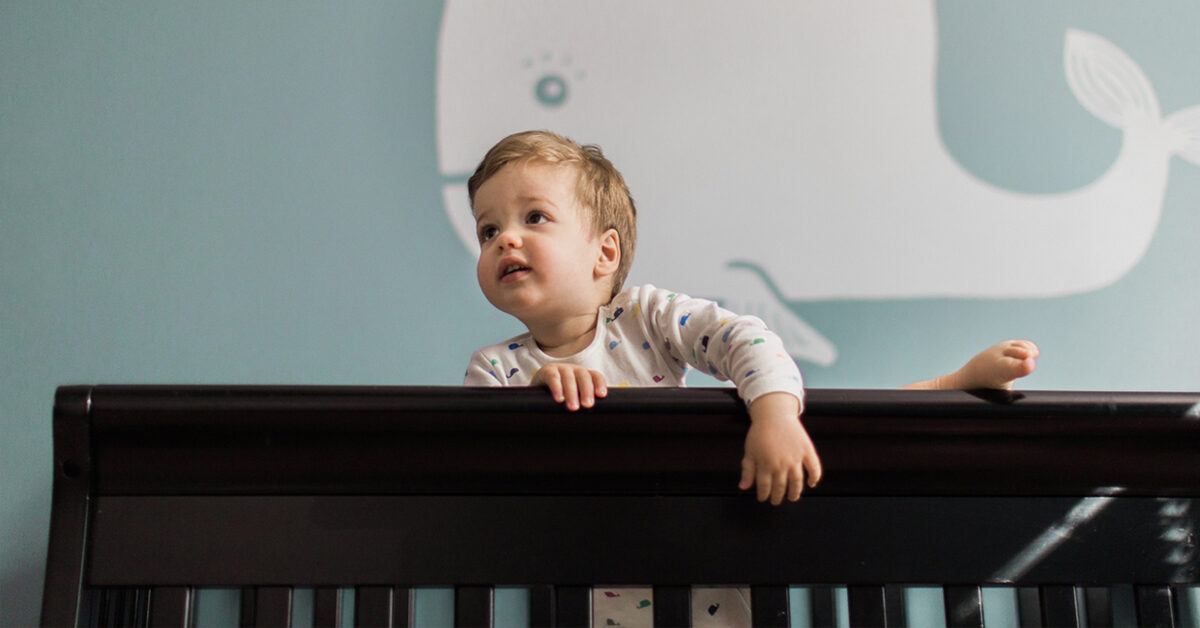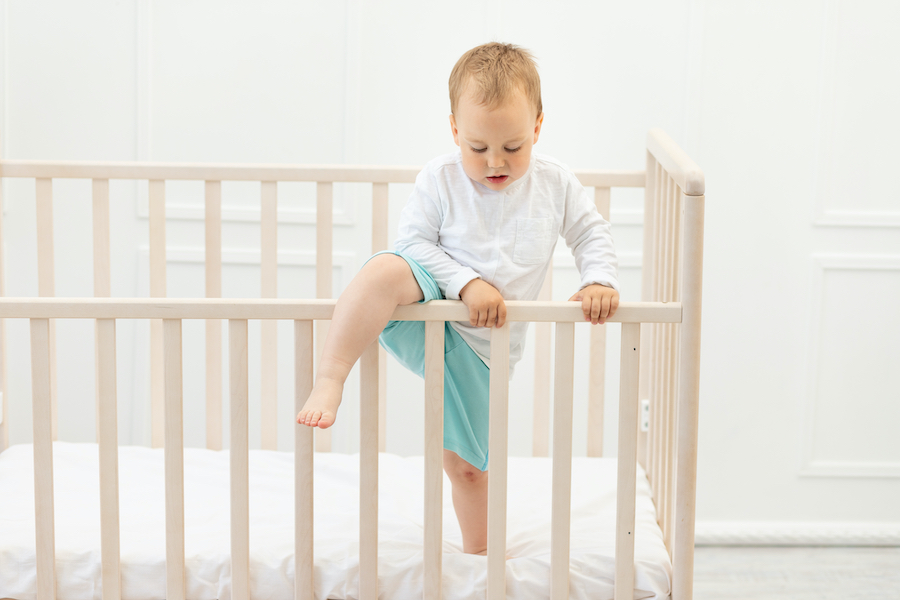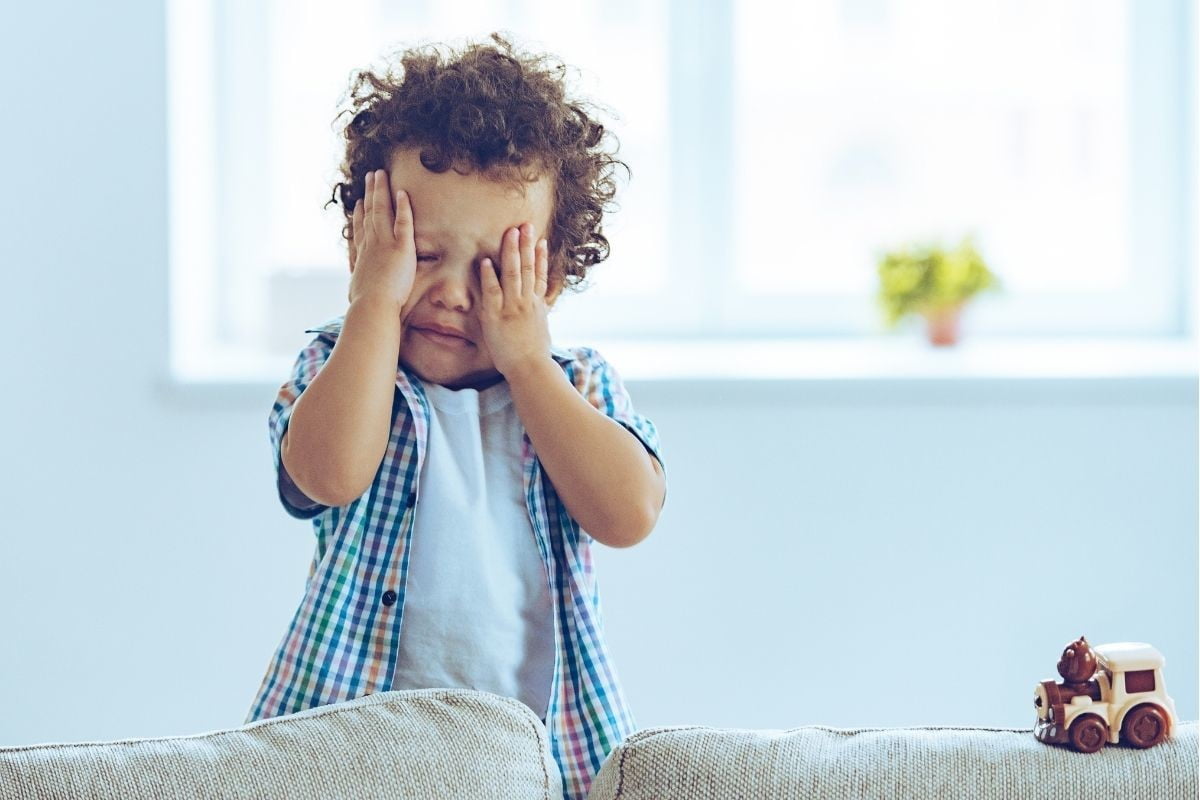Children are very curious about their surroundings. Unfortunately, this often leads them to crawl into areas that are unsafe for them. Sometimes, the danger is in their own home.
The American Academy of Pediatrics (AAP) recommends that babies sleep on their backs to reduce the risk of Sudden Infant Death Syndrome (SIDS). If your baby doesn't go to bed on his or her back, there are things you can do to help keep him or her safe while sleeping. One of these is having a crib attached tightly to the wall. A baby may be injured if he rolls over in his sleep and falls out of the crib. Even an inch or two away from the wall can make a big difference for this safety measure. This information applies if your baby has started pulling himself up on furniture or standing up at all, most infants aren't able to do this until after 9 months of age.
However, even attached to the wall, accidents happen.
If you want to ensure that your child is as safe as possible, here are some things you can do:
- Make sure all crib slats are less than 2-3/8 inches apart. This prevents a baby from getting his head stuck between them and increases safety.
- Remove mobiles and hanging toys from the crib.
- Do not put pillows, comforters, or bumper pads in the crib.
- Only use a sheet that is tightly fitted to the mattress.
- If you have a convertible crib, make sure it is in the lowest position by the time your child can stand up.
Babies who are able to pull themselves up on furniture or stand up are also at risk for falls. In fact, falls are one of the leading causes of injury in children aged 0-4 years old.

To prevent your baby from falling off furniture:
- Make sure all furniture is stable and has no sharp edges.
- Keep out of reach. Cords from window blinds and draperies can be a strangulation hazard.
- Do not put televisions or other heavy objects on low furniture.
- Move all breakable objects out of your child's reach.
- Install window guards and safety gates to prevent falls downstairs.
Of course, it's important to remember that even with the best precautions, accidents can still happen. If your baby does fall off the bed or any other piece of furniture, call your doctor right away. Depending on the severity of the injury, you may need to take your child to the emergency room. The most important thing is to stay calm and act quickly. Falls can be very scary for both parents and children. But by being proactive about safety and knowing what to do, you can help your baby get the help he or she needs without unnecessary fear.
What to do if baby falls off the bed
If the baby is injured and/or crying, call for help. If you can't move the child yourself, ask someone to call 911 or your local emergency number immediately.
Pick up the child carefully and inspect him or her for injuries such as bleeding (lacerations), bruising (contusions), broken bones, and head injuries. Try not to move the neck if a spinal injury seems possible; instead, locate your pediatrician's phone number and follow instructions over the phone. If any of these injuries are found, see Emergency Medical Services (EMS) personnel as soon as possible at the hospital emergency room or urgent care clinic before going home.
If none of these conditions apply, check whether the baby is alert & oriented by asking: "What's your name?" (prompting for the full name, if known). "Where are you?" If the baby is alert & oriented, call your pediatrician's office - their on-call schedule may direct you to go directly to the urgent care clinic.
If there are no injuries and/or the baby is not crying or seems otherwise distressed, put him back in his crib after he has calmed down. While comforting your child, watch for signs of injury such as nausea or dizziness which could indicate a possible concussion.
Make sure your child sees a physician within 24 hours - sooner if any symptoms worsen or persist beyond that time period.
If you suspect a fracture, call 911 or your local emergency number. Do not attempt to move the child.
Keep the child still; do not let him walk around on an injured leg because that could worsen the injury. However, if necessary (e.g., for diaper change) and if comfortable doing so, try to reduce any obvious deformity by keeping one hand behind the knee while gently straightening out or bending the other leg in front of it until it is more comfortable again.
Do not attempt to align any part of a bone yourself since this can cause further damage and increase bleeding: "Leave-it-alone" applies!
Never give aspirin to anyone under age 19 - even infants - because of Reye's Syndrome.
In the event of a fall, it is important to remain calm and take action quickly. By following these simple steps, you can ensure that your baby gets the help he or she needs.

Steps to take if your child fell off the bed:
- Stay calm
- Check for injuries
- Call for help if needed
- Put baby back in the crib
- Watch for signs of injury
- Take the child to the doctor if necessary
- If the fracture is suspected, call 911 or a local emergency number. Do not attempt to move the child.
What are the symptoms?
There are usually no symptoms. The baby may cry or be upset, but this will soon pass as he settles down and starts to feel better.
What happens inside the child's body?
If your baby has not hit his head when he fell off the bed, there is probably no serious injury. He will usually recover very quickly.
Swelling or bruising might take a few days to appear if there is any internal injury, although sometimes these signs do not show up until several days afterward. If there are still signs of shock after 24 hours, your doctor can test your baby for internal injuries with an ultrasound scan.
How long does recovery take?
Most babies completely recover within a week or so. If there is any bruising, it usually disappears within a few weeks. It takes longer for more serious injuries to heal, but even these will get better eventually.
How can I help my baby recover?
There is little you need to do except make sure your child gets plenty of rest and has extra drinks if he seems thirsty. Prompt medical attention may be needed in the following situations:
- The baby was unconscious when he fell off the bed
- There are signs of shock, such as a pale face or cold hands and feet
- Symptoms such as vomiting or loss of balance continue after 24 hours
If you have any questions about this topic, speak with your pediatrician. Your local emergency number is 911.

What are the signs of internal injuries?
If your child has hit his head or face, look at him carefully for any of these signs.
- The baby feels sleepy and does not want to feed well
- Baby is sick
- The baby seems dazed or looks vacant
- Stiff neck
- Loss of balance
- Weakness on one side
- Not urinating as usual
- Vomiting
- Blood in stools or vomit
- Bluish skin under fingernails or lips
Symptoms usually go away after 24 hours, but sometimes they don't show up until several days later.
Hospitalization is usually not necessary unless there is an increased risk of seizure due to previous injuries, bleeding within the brain, or neurological problems before they fall occurred. In cases of more severe trauma after falling from heights greater than 3 feet (or 1 meter), hospitalization is needed for close observation of changes in mental status.
Weakness on one side of the body might indicate damage to one side of the brain. Headaches, neck pain, vomiting, and problems with balance or coordination might also be symptoms of a more serious head injury.
If you think your baby has a concussion, please seek medical attention right away. A doctor will be able to diagnose a concussion through a physical examination and by asking about the fall. Imaging tests such as CT scans or MRIs are not usually necessary but may be ordered if there is any concern for internal bleeding or skull fracture.
Most babies who fall off beds suffer only minor injuries, such as scrapes and bruises.
To treat these injuries:
- Apply pressure to any bleeding wounds with a clean cloth or bandage.
- Clean the wound with warm water and mild soap. Do not use harsh chemicals or alcohol on the wound.
- Apply a cold compress to the injury to reduce swelling and pain.
- If the baby is crying inconsolably or has vomited, try to give them a few teaspoons of clear Pedialyte or water.
- Keep the child calm and rested. Excessive activity can worsen concussion symptoms.
Babies who fall from beds often do not sustain serious injuries, but it is important to be aware of the signs and symptoms of a head injury so that you can seek medical attention if necessary. By following these simple steps, you can make sure your child gets the proper care after a fall. Thanks for reading!